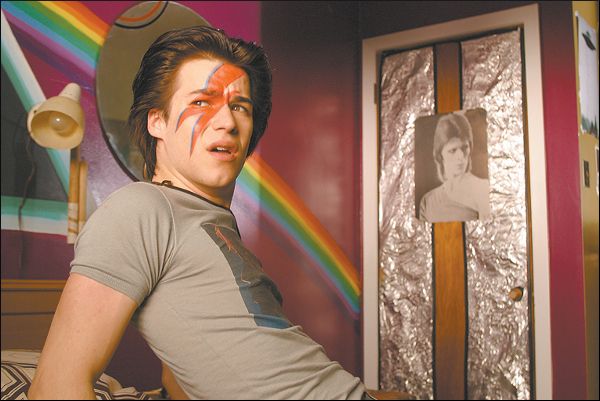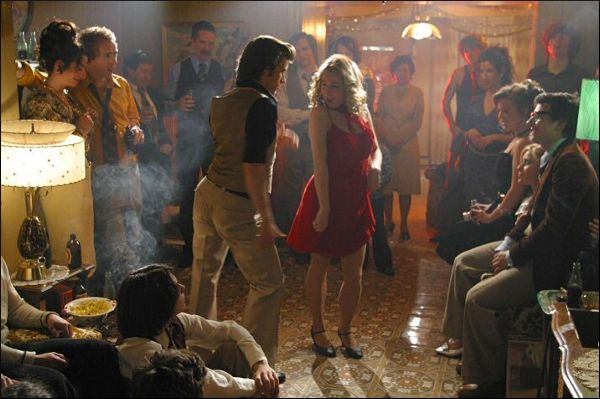Upon its 2005 release, Jean-Marc Vallee’s C.R.A.Z.Y. was received with critical acclaim and quickly became an audience favourite in Quebec. The film is about the coming of age (and coming out) of Zachary Beaulieu and the relationship he has with his father. It spans 20 years, and as Zachary changes so does the world around him. The struggles that he faces as a young homosexual growing up in Quebec are punctuated by his family’s working class background, which values traditional gender roles, and by his Canadian province’s move away from its Catholic roots. This is demonstrated by important cultural and historical factors, like language and Quebec’s Quiet Revolution, which many consider the beginning of modern-day Quebec.
"Through linguistic and cultural details, it is made clear that Zachary is born into a working class environment with heavy ties to the Church."
Born on Christmas Day in 1960, Zachary is brought into the world as Quebec reaches a pivotal stage. Just a few months prior, the long-standing premier Maurice Duplessis (who first came to power in 1936 and was the elected leader of the province for nearly 20 years) had died, marking the beginning of the Quiet Revolution, a peaceful revolution marked by very rapid secularization as well as the introduction of important social programs and the emergence of a strong sense of Quebec nationalism. Though the Church lost much of its influence during this period, its hold and the conservative values related to it remained strong in certain sections of the population. Through linguistic and cultural details, it is made clear that Zachary is born into a working class environment with heavy ties to the Church. Born into this “New Quebec,” Zachary is very much at odds with his parents and even with his siblings, as his sexuality runs counter to his family’s religious affiliation and his father’s machismo.

This immense cultural gap is emphasized through the use of music. In one of the best sequences in the film, the whole family attends a Christmas mass, in which Zachary starts to imagine that he is floating above the whole crowd as it breaks out singing a rendition of the Rolling Stones’ “Sympathy for the Devil.” This sequence suggests that Zachary is not a part of this religious world and that the significance of the church has changed from one generation to the next. Zachary’s father is instead associated with the song “Emmenez-Moi” by Charles Aznavour, a popular French singer to this day, as well as by Patsy Cline’s “Crazy.” Zachary’s taste in music is always contemporary and in a constant state of change, just like his world. However, his father’s taste remains inflexible, reflecting his character.
In terms of language, the majority of the characters speak la joual, a term used to describe a working class language used by the Quebecois. As the film is set in the 1960s-70s, the association of this language is with the lower classes, although in recent decades it has been adopted more widely as a matter of pride in Quebecois identity. La joual abbreviates many words or emphasizes different syllables than Parisian French. Two examples are “puis” becoming “pi” and “toi” becoming “toé”. Also emblematic of la joual is the intermingling of English words with French. Throughout the film, English words leak into the conversations, notably “tuxedo,” in one particular sequence, and “fuck” throughout the film (“fuck” does not have the same power in French as in English, as it is regularly featured on TV sitcoms geared towards families. It is a soft swear word like “damn” or “crap”).
"C.R.A.Z.Y. is a powerful film that portrays, with a lot of humour and fantasy, the struggles of growing up and coming out during the 1960s and 1970s in Quebec."
In comparison to many other French speaking nations, notably France, most curse words derive from Catholic services. Words like "sacrer" (blessed), "câlice" (chalice), and the more popular "tabarnac" (tabernacle) are all almost exclusive to Quebecois French (though there are equivalences in both Spanish and Italian). Used liberally throughout the film, they further establish the social status of the family while emphasizing the intimate connection the Catholic Church had to the development of the province’s identity. Though today Quebec is among the most secularized provinces in Canada, the continued presence of these words and Catholic imagery in daily life continues. The difference between the French spoken in C.R.A.Z.Y. and that spoken in France is quite drastic, which is easily demonstrated by the fact that certain sequences were subtitled in French when the film was screened in France.
C.R.A.Z.Y. is a powerful film that portrays, with a lot of humour and fantasy, the struggles of growing up and coming out during the 1960s and 1970s in Quebec. It deals with a world that is becoming increasingly progressive but is still heavily influenced by its conservative past. The film utilizes the beginning of Quebec’s Quiet Revolution as a means of mirroring Zachary’s struggle, suggesting that revolution is a slow process.





